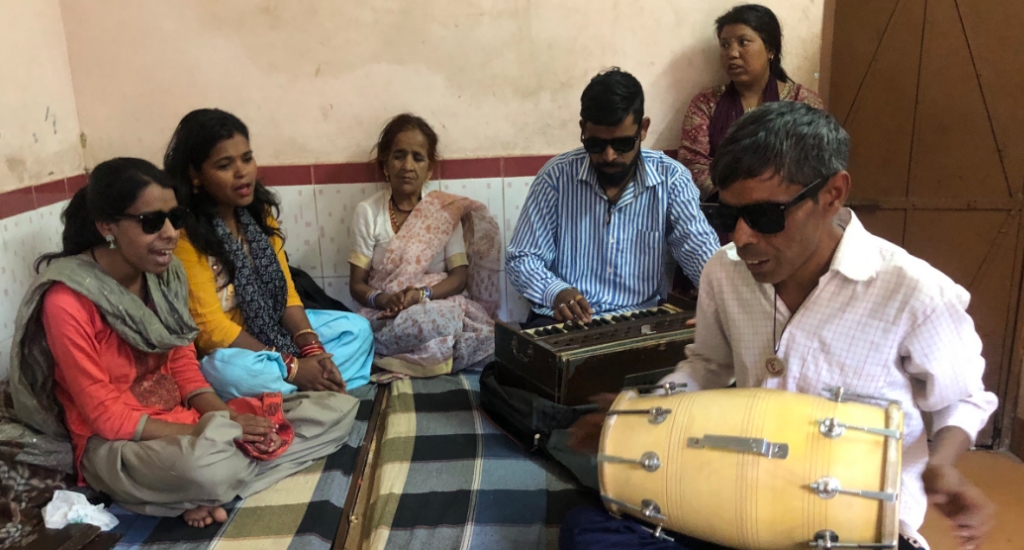
Blind siblings from Uttarakhand on road to musical success
Born to daily wage labourers and facing the harsh realities of their disability, three blind siblings are making a name for themselves through their music in Garhwali and Kumaoni languages.

Born to daily wage labourers and facing the harsh realities of their disability, three blind siblings are making a name for themselves through their music in Garhwali and Kumaoni languages.
With eyes closed to the world’s sights, musicians Andrea Bocelli, Stevie Wonder and Ravindra Jain open the boundless expanse of melody that transcends vision. So do the siblings in Kotla Mandla, a village at the foot of the Himalayas near Kotdwar in Uttarakhand.
Like the blind maestros, the music of the Anuragi siblings – Nirmal, Mukesh and Anjali – create a lyrical bridge between worlds, where melodies are not just heard, but felt. A powerful example of the power of the human spirit to rise above all challenges.
The two brothers and their sister were born blind to Rajeshwari and the late Ummed Singh, daily wage labourers who accepted the reality of their children’s condition after many failed treatments.

“They were born with a damaged nerve that couldn’t be cured,” said Rajeshwari, their mother. “My husband and I had to work every day, leaving them alone at home. They had to rely on each other.”
Inside their modest house, the delicate strains of a harmonium blend with the rhythmic beat of a tabla, creating strains that piques the curiosity of anyone who hears it.
Nirmal, the eldest at 36, found solace in music from an early age. His fascination began with listening to the radio, and it wasn’t long before he was mimicking tunes and creating his own melodies using whatever objects he could find — window grills, glass bottles and more. His love of music became a sanctuary during a childhood limited by the walls of their home.
Also Read: Odisha’s blind women cricketers eye spot in Indian squad
“When Mukesh and Anjali came along, I took on the role of their caretaker and encouraged them to join in our musical games,” Nirmal said. “We would improvise with whatever we had. I remember playing the melody of ‘Phoolon sa chehra tera’ (from the 1993 Bollywood movie Anari, sung by Udit Narayan) with a glass bottle.”
Although every chord in their music resonates with the beauty of the unseen, their visual impairment truncated their education after class 8.
“We learned oral Hindi, English and maths,” said 26-year-old Anjali. “Our teachers appreciated our singing at school events, which boosted our confidence and pushed us to pursue music professionally.”

The family’s need for additional income led the siblings to turn their passion into a livelihood. Nirmal became the lead musician and singer while Anjali took on the role of the female lead, and Mukesh became the versatile instrumentalist, mastering the harmonium, tabla, dholak, guitar and flute.
Their journey took a turn when they met Kishna Bagot, a content creator and artiste from Uttarakhand. Moved by their story, Bagot became their manager, arranging paid gigs and concerts to help them sustain their craft.
“When I met them, they were struggling,” Bagot said. “Even today, opportunities are scarce, and they rarely get a full stage. Transport in the mountains is also a huge challenge.”
The siblings face various hurdles. Navigating the rugged terrain of their remote village is arduous, often requiring the assistance of their mother. “We struggle with transportation and often have to walk long distances,” Nirmal explained.
Also Read: Odisha dholak player’s journey from village squares to viral video
But perseverance is their main show, helping them overcome dismissive attitudes and exploitation.
“Initially, we performed for free,” Nirmal recounted. “When we started requesting payment, people stopped calling us. They took advantage of our situation, thinking they could exploit us.”
Their determination did not wane. Their songs, primarily in Garhwali and Kumaoni languages, have started to gain recognition. Their performance at a Mumbai event attended by over 30,000 people a decade ago remains a cherished memory for Nirmal, as does receiving a medal from then Delhi chief minister Sheila Dikshit, who was in office for 15 years from 1998 to 2013.
To date, the trio has performed at more than 500 events and released several albums. Yet, financial constraints and limited opportunities persist.

“Each video costs around Rs 50,000 to produce,” Bagot said. “Finding sponsors and funding is challenging. We need a dedicated marketing person to promote their work and help them establish a presence on social media.”
The siblings’ spirit remains unbroken though. They are driven by a vision to not only continue their musical journey but to empower others. Nirmal dreams of opening a music school for the blind to help others pursue careers in music.
“We have faced numerous challenges. Challenges don’t trouble us,” he said. “We are moving towards a better future. We believe that our journey, filled with struggles and triumphs, can inspire others to make the most out of their lives.”
Also Read: Odisha school bridges gap between disability and ability
The lead image on top shows the visually challenged Anuragi siblings – Nirmal, Mukesh and Anjali – showcasing their music. (Photo by Shreya Pareek)
Shreya Pareek is a solution journalist with over 10 years of experience in covering stories of positive social change.